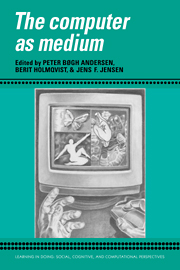Book contents
- Frontmatter
- Contents
- Series foreword
- Preface
- Contributors
- Part I Computer-based signs
- Part II The rhetoric of interactive media
- Introduction
- 6 Narrative computer systems: The dialectics of emotion and formalism
- 7 Interactive fiction: Artificial intelligence as a mode of sign production
- 8 Plays, theaters, and the art of acting in the eighteenth century: A formal analysis
- 9 The meaning of plot and narrative
- 10 Face to interface
- 11 Drawing and programming
- 12 Hypermedia communication and academic discourse: Some speculations on a future genre
- Part III Computers in context
- Index
12 - Hypermedia communication and academic discourse: Some speculations on a future genre
Published online by Cambridge University Press: 05 October 2010
- Frontmatter
- Contents
- Series foreword
- Preface
- Contributors
- Part I Computer-based signs
- Part II The rhetoric of interactive media
- Introduction
- 6 Narrative computer systems: The dialectics of emotion and formalism
- 7 Interactive fiction: Artificial intelligence as a mode of sign production
- 8 Plays, theaters, and the art of acting in the eighteenth century: A formal analysis
- 9 The meaning of plot and narrative
- 10 Face to interface
- 11 Drawing and programming
- 12 Hypermedia communication and academic discourse: Some speculations on a future genre
- Part III Computers in context
- Index
Summary
The written genres of academic communication have evolved and consolidated ever since the founding of Plato's Academy. The conventions, structures, and rhetoric of academic writing and publication have gradually adapted to various technologies and requirements. With the quality of current computer technology, academia is faced with a complex and flexible medium, offering radical extensions to the handling of knowledge and information. It is yet uncertain what consequences this transition will have upon academic communication, but they are likely to be significant.
Experience and knowledge originate after the events, after their objects or entities have appeared and established themselves as subject matters. The title of this chapter suggests a synthesis of hypermedia communication and academic discourse that is in many ways still in its infancy. Consequently the reflections put forward here are speculations prior to the events rather than direct analysis of existing practise. But given the fact that few innovations are radically new or alien to the hosting environment — more a conglomerate of old and new — a certain level of understanding might be deduced in advance. The lack of existing examples of the relationship between this new form of media and established academic convention, unfortunately, means that this chapter can only be exploratory and tentative, and must therefore involve a high level of abstraction. What follows are projections and extrapolations prefacing events to come. The purpose of this is to attempt to identify some possibilities and problems relevant in the evolution of hypermedia.
- Type
- Chapter
- Information
- The Computer as Medium , pp. 263 - 284Publisher: Cambridge University PressPrint publication year: 1994



